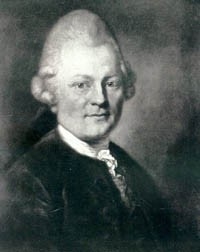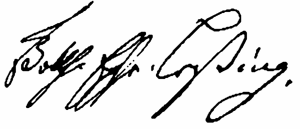Gotthold Ephraim Lessing
Gotthold Ephraim Lessing (22 January, 1729 – 15 February, 1781) was a German writer, philosopher, publicist, and art critic, was one of the most outstanding representatives of the Enlightenment era. With his plays and his theoretical writings he substantially influenced the development of German literature.
Life
Lessing was born in Kamenz, a little town in Saxony. His father was a clergyman and the author of theological writings. After visiting Latin School in Kamenz (from 1737 onwards) and the Fürstenschule St. Afra in Meissen (from 1741 onwards) he studied theology and medicine in Leipzig (1746-1748).
From 1748 to 1760 he lived in Leipzig and Berlin and worked as reviewer and editor for, amongst others, the Vossische Zeitung. In 1752 he took his Master's degree in Wittenberg. From 1760 to 1765 he worked in Breslau (now Wroclaw) as secretary to a General Tauentzien. In 1765 he returned to Berlin, only to leave again in 1767 to work for three years as a dramaturge and adviser at the German National Theatre in Hamburg. There he met Eva König, his future wife.
In 1770 Lessing became a librarian at the Herzog-August-Bibliothek in Wolfenbüttel. His tenure there was interrupted by many travels. For example, in 1775 he journeyed to Italy accompanied by Prince Leopold.
In 1776 he married Eva König, who was widowed now, in Jork (near Hamburg). She died in 1778 after giving birth to a short-lived son.
On 15 February, 1781, Lessing, now aged 52, died during a visit to the wine dealer Angott in Braunschweig.
Work
Lessing was a poet, philosopher and critic. As an outstanding representative of the German Enlightenment he became the leading figure for the new self-confidence of the bourgeoisie. His theoretical and critical writings are remarkable for their often witty and ironic style and their unerring polemics. Hereby the stylistic device of dialogue met with his intention of looking at a thought from different angles and searching for elements of truth even in the arguments made by his opponents. For him this truth was never solid or something which could be owned by someone but always a process of approaching.
Early in his life, Lessing showed interest in the theatre. In his theoretical and critical writings on the subject—as in his own plays—he tried to contribute to the development of a new bourgeois theatre in Germany. With this he especially turned against the then predominant literary theory of Gottsched and his followers. He particularly criticised the simple imitation of the French example and pleaded for a recollection of the classic theorems of Aristotle and for a serious reception of Shakespeare's works. He worked with many theatre groups (e.g. the one of the Neuberin).
In Hamburg he tried with others to set up the German National Theatre. Today his own works appear as prototypes of the later developed bourgeois German drama. Miß Sara Sampson and Emilia Galotti are seen as the first bourgeois tragedies, Minna of Barnhelm (Minna von Barnhelm) as the model for many classic German comedies, Nathan the Wise (Nathan der Weise) as the first ideological idea drama ("Ideendrama"). His theoretical writings Laocoon and Hamburgian Dramaturgy (Hamburgische Dramaturgie) set the standards for the discussion of aesthetic and literary theoretical principles.
In his religious and philosophical writings he defended the faithful Christian's right for freedom of thought. He argued against the belief in revelation and the holding on to a literal interpretation of the Bible by the predominant orthodox doctrine. As a child of the Enlightenment he trusted in a "Christianity of Reason", which oriented itself by the spirit of religion. He believed that human reason (initiated by criticism and dissent) would develop, even without help by a divine revelation.
In addition, he spoke up for tolerance of the other world religions in many arguments with representatives of the predominant schools of thought (e.g. within the "Anti-Goeze"). He also worked this position into his dramatic work (in Nathan der Weise) when he was forbidden to publish further theoretical writings. In his writing The Education of Humankind (Die Erziehung des Menschengeschlechts) he extensively and coherently lays out his position.
The idea of freedom (for the theatre against the dominance of its French model; for religion from the church's dogma) is his central theme throughout his life. Therefore he also stood up for the liberation of the upcoming bourgeoisie from the nobility making up their minds for them.
In his own literary existence he also constantly strove for independence. But his ideal of a possible life as a free author was hard to keep up against the economic constraints he faced. His project of authors self-publishing their works, which he tried to accomplish in Hamburg with C.J. Bode, failed.
Lessing is important as a literary critic for his work Laocoon: An Essay on the Limits of Painting and Poetry. In this work, he argues against the tendency to take Horace's ut pictura poesis (as painting, so poetry) as prescriptive for literature. In other words, he objected to trying to make literature do what painting does. Instead, poetry and painting each has its character (the former is extended in time; the latter is extended in space). This is related to Lessing's turn from French classicism to Aristotlian mimesis, discussed above.
Selected bibliography
- The Young Scholar (Der junge Gelehrte) (1748)
- The Freethinker (Der Freigeist) (1749)
- The Jews (Die Juden) (1749)
- Miß Sara Sampson (1755)
- Philotas (1759)
- Fables (Fabeln) (1759)
- Laokoon oder Ueber die Grenzen der Malerei und Poesie (1766)
- Minna of Barnhelm (Minna von Barnhelm) (1767)
- Emilia Galotti (1772)
- Anti-Goeze (1778)
- Nathan the Wise (Nathan der Weise) (1779)
- Ernst und Falk - Gespräche für Freymäurer (1776-1778)
- The Education of Humankind (Die Erziehung des Menschengeschlechts) (1780)
See also
- Greek revival
External links
- Works by Gotthold Ephraim Lessing. Project Gutenberg
- Lessing's works online (in German)
da:Gotthold Ephraim Lessing de:Gotthold Ephraim Lessing es:Gotthold Ephraim Lessing eo:Gotthold Ephraim Lessing fr:Gotthold Ephraim Lessing hr:Gotthold Ephraim Lessing it:Gotthold Ephraim Lessing he:גוטהולד אפרים לסינג ka:ლესინგი, გოტჰოლდ ეფრაიმ hu:Gotthold Ephraim Lessing nl:Gotthold Ephraim Lessing ja:ゴットホルト・エフライム・レッシング no:Gotthold Ephraim Lessing nn:Gotthold Ephraim Lessing pl:Gotthold Ephraim Lessing pt:Gotthold Ephraim Lessing ru:Лессинг, Готхольд Эфраим sk:Gotthold Ephraim Lessing fi:Gotthold Ephraim Lessing sv:Gotthold Ephraim Lessing zh:戈特霍尔德·埃夫莱姆·莱辛
Credits
New World Encyclopedia writers and editors rewrote and completed the Wikipedia article in accordance with New World Encyclopedia standards. This article abides by terms of the Creative Commons CC-by-sa 3.0 License (CC-by-sa), which may be used and disseminated with proper attribution. Credit is due under the terms of this license that can reference both the New World Encyclopedia contributors and the selfless volunteer contributors of the Wikimedia Foundation. To cite this article click here for a list of acceptable citing formats.The history of earlier contributions by wikipedians is accessible to researchers here:
The history of this article since it was imported to New World Encyclopedia:
Note: Some restrictions may apply to use of individual images which are separately licensed.

